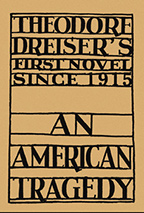A masterpiece of a story, but long-winded in the telling
An American Tragedy, a novel by Theodore Dreiser, was first published in 1925. Although these days Dreiser may best be remembered as the author of Sister Carrie, An American Tragedy, from its high-falutin title to its mammoth size, shows all the signs of having been his intended magnum opus. An early dust jacket for the book proclaims that this is “Dreiser’s first novel since 1915,” and judging by the sheer length of this tome, it’s not hard to believe it could have taken him a decade to write it. This novel has some shortcomings in its execution, but nonetheless it is arguably the most powerful story Dreiser ever wrote.
Clyde Griffiths is the son of devoutly religious parents who run a mission in Kansas City. The parents take the children out in the evenings to preach, sing, and collect donations in the streets. While his siblings don’t necessarily seem to mind this lifestyle so much, teenaged Clyde chafes under this enforced proselytizing and the relative poverty that comes with it. He wants to live like a regular young man, wear nice clothes, and date girls. He decides to get a job, both to raise money to help the family and to excuse himself from the street preaching. After a few brief stints at other work, he secures a position as a bellboy at the fancy Hotel Green-Davidson. Clyde starts hanging out with his more experienced coworkers and begins to get involved with alcohol and sex, all the while keeping his new sinful life a secret from his parents.
The story of Clyde Griffiths may be one of the most compelling and memorable in American literature, one worthy of the illusive “Great American Novel” label. It’s in the telling of the tale, however, that the book has its faults. Even at the height of its tension and suspense, the text is very repetitive, often recounting the same scenes over and over again. Chapters often seem to proceed sluggishly in real time, when some summarization could have sufficed. As one of America’s preeminent literary naturalists, Dreiser’s strength is illuminating the epic dramas that take place in real American lives. At times, however, he seems to forget that this isn’t real life but a novel, and as such should be written as a novel, with a little less procedural tone and a little more poetic license in the storytelling.
Clyde Griffiths is the son of devoutly religious parents who run a mission in Kansas City. The parents take the children out in the evenings to preach, sing, and collect donations in the streets. While his siblings don’t necessarily seem to mind this lifestyle so much, teenaged Clyde chafes under this enforced proselytizing and the relative poverty that comes with it. He wants to live like a regular young man, wear nice clothes, and date girls. He decides to get a job, both to raise money to help the family and to excuse himself from the street preaching. After a few brief stints at other work, he secures a position as a bellboy at the fancy Hotel Green-Davidson. Clyde starts hanging out with his more experienced coworkers and begins to get involved with alcohol and sex, all the while keeping his new sinful life a secret from his parents.
It’s difficult to summarize the plot of An American Tragedy without spoiling it, because no events of import really occur until halfway through the book. The first half of the novel is mostly overly protracted character development. Dreiser is celebrated for his realism, and he has certainly succeeded here in crafting authentic characters and a realistic narrative. When reading about Clyde’s youth, I felt like I had lived most of his experiences myself as a young man (minus the prostitutes), which speaks to the book’s authenticity, but the familiarity of such scenes also lessens some of the dramatic impact. Readers of Dreiser’s day might have been shocked at Clyde’s teenaged adventures, but today’s audience not so much. If you make it through the rather lethargic first half, the second half of the novel is far superior. Dreiser’s frank and multifaceted depiction of small-town life calls to mind Truman Capote’s creative nonfiction masterpiece In Cold Blood. Dreiser is to be commended for his honest and forthright discussions of premarital sex, birth control, and other matters that would have offended the propriety of many readers of the 1920s.
.
The story of Clyde Griffiths may be one of the most compelling and memorable in American literature, one worthy of the illusive “Great American Novel” label. It’s in the telling of the tale, however, that the book has its faults. Even at the height of its tension and suspense, the text is very repetitive, often recounting the same scenes over and over again. Chapters often seem to proceed sluggishly in real time, when some summarization could have sufficed. As one of America’s preeminent literary naturalists, Dreiser’s strength is illuminating the epic dramas that take place in real American lives. At times, however, he seems to forget that this isn’t real life but a novel, and as such should be written as a novel, with a little less procedural tone and a little more poetic license in the storytelling.
If you liked this review, please follow the link below to Amazon.com and give me a “helpful” vote. Thank you.



No comments:
Post a Comment